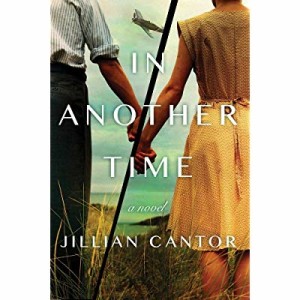
by Yona Zeldis McDonough
A Novel Bends Time at the Onset of the Holocaust

A talented young female musician, the bookselling man who loves her and a quasi-magical way to escape the rising Nazi horror in Germany are the key elements in Jillian Cantor’s latest novel, In Another Time.
Below she chats with Fiction Editor Yona Zeldis McDonough about how she crafted this original and compelling story that asks whether it’s really possible to escape the horrors of history.
Yona Zeldis McDonough: Music plays a very important role in the novel; are you or have you ever been a musician?
Jillian Cantor: I used to be a musician. I played the clarinet (and also a little bit of piano and saxophone) starting when I was 10 and up through the first half of college. In high school, I was in every music group: marching band, orchestra, jazz band, youth orchestra, etc. My husband was a percussionist and we met in band in high school. I haven’t played in around twenty years, but music is still a big part of my life. My family goes to the symphony and musicals and concerts all the time. I love to listen to all kinds of music.
YZM: Let’s talk about time travel — where did the idea come from?
JC: In Another Time is set in two time periods — Max narrates the novel in the 1930s outside Berlin, while Hanna narrates it in the 1940s and 50s after the war. In the 30s they meet and fall in love, but in Hanna’s story, after the war, she isn’t sure what happened to Max, or her, for that matter, during war. Not to give away too much about the plot, but you learn pretty early in the book that Max does have a way to travel forward in time, and as the plot plays out you see how this shapes both of their stories in different ways.
My initial idea for the novel was that I wanted to set a story in Germany as Hitler was rising to power. I wanted to examine why people left or didn’t leave, even as things were growing increasingly worse in the country. What if you had everything at your disposal, even a way to know a future that probably would’ve been unfathomable to German citizens in the early 1930s, and a magical way to escape that future? And what if you still wanted to stay where and when you were living, in spite of that? The book to me is very much about what it means to love your country and your home, and what and how much it takes to leave it.
YZM: Certain characters, like Julia, undergo significant changes during the course of the novel while others, like Max, don’t seem to change at all; care to comment?
JC: We mainly see Max over a few year period in the 1930s, while we get to see Julia, and Hanna, on and off between 1931 and 1958, spanning countries, and also the war and its aftermath. So some characters had space to grow more because I was able to portray them over a bigger portion of their lives.
YZM: What are the challenges — and joys — of writing in another time period?
JC: The challenges are always in the details of trying to recreate a world and time I haven’t lived in. I often get stuck on communication or moving characters from one place to another. How easy we have today when we can simply text or email or call, but my characters have to work harder to connect.
The joys lie in much the same — recreating and reimagining a world I haven’t lived in and haven’t experienced, but getting to understand and experience and learn while I write.
YZM: Can you describe your research process?
JC: I usually do an initial round of research before I start writing. Enough to ground me in the time and place and details, and then I try to get the first draft of the story down knowing what I know and really focusing on the characters and the story itself. After that’s done, I do another, bigger round of research, pulling out specifics and details I can add or might have missed the first time through.
YZM: What else would you like to tell your readers?
JC: In Another Time is very much a love story between Hanna and Max, very much about how their love is shaped and changed by the rise of Hitler in Berlin and the aftermath of the war. But it’s also a love story about music and books, about their power in our darkest times. It has been one of my favorite stories to write because those are the things that are often most healing in my life, too.
The views and opinions expressed in this article are the author’s own and do not necessarily reflect those of Lilith Magazine.
